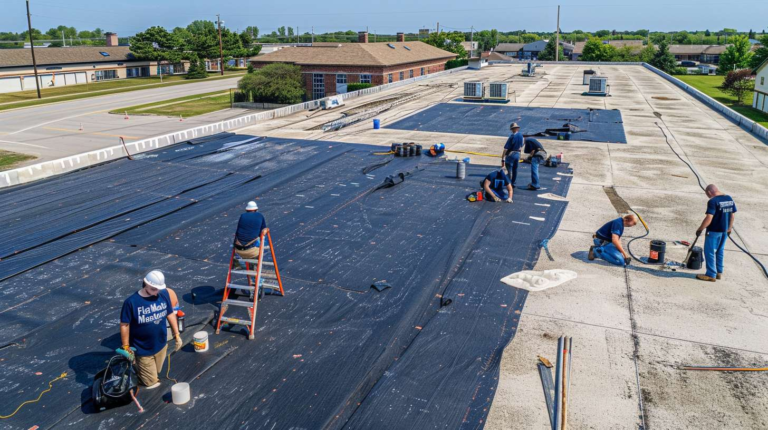Professional Residential Flat Roofing Services You Can Trust
Look, I've been installing and repairing flat roofs across Queens for over two decades now, and I can tell you straight up - residential flat roofing isn't just about slapping some membrane on your house and calling it good. These systems need real expertise, especially here in Queens where we deal with everything from nor'easters to those brutal summer heat waves that can cook a poorly installed roof in just a few seasons.
At Flat Masters NY, we've handled every type of flat residential roofing challenge you can imagine. From the brick colonials in Forest Hills to the modern additions in Long Island City, each project teaches us something new. But here's what never changes - the fundamentals of proper drainage, quality materials, and installation that'll actually last.
Why Residential Flat Roofing Requires Specialized Knowledge
So what makes domestic flat roofing different from the commercial stuff? Everything. Your house isn't a warehouse - it has HVAC units, chimneys, dormers, and all sorts of penetrations that create potential leak points. Plus, you're living under that roof every day. When a commercial building has a small leak, maybe it drips into a storage area. When your house has a leak, it's dripping onto your kitchen table or into your kid's bedroom.
I remember this job we did last fall on 43rd Avenue in Sunnyside. The homeowner had tried three different contractors over five years to fix recurring leaks on their flat roof addition. Each one just patched over the previous guy's work. When we stripped it down, we found seven different layers of materials - felt, modified bitumen, liquid coatings, more felt, patches, caulk, and even some aluminum foil someone had tried to use as a temporary fix that became permanent. It was a mess.
Common Types of Flat Roofing for Domestic Properties
Here in Queens, we see four main types of flat roofing for domestic properties:
- EPDM Rubber Roofing - Great for smaller residential areas, typically lasts 15-25 years
- Modified Bitumen - Popular for additions and extensions, excellent durability
- TPO Single-Ply - Energy efficient, reflects heat well in summer
- Built-Up Roofing (BUR) - The old-school hot tar method, still works great when done right
Each system has its place. EPDM is what we recommend most for residential flat roofing applications under 2,000 square feet. It's cost-effective, relatively easy to repair, and handles our freeze-thaw cycles well. But if you've got a larger area or want maximum longevity, modified bitumen with a granulated cap sheet is hard to beat.
TPO has gotten really popular in the last ten years, especially with homeowners who care about energy efficiency. That white surface reflects a lot of heat, which can actually make a difference on your electric bill during those August heat waves.
The Drainage Challenge in Residential Applications
Look, I don't care what anyone tells you - flat roofs aren't actually flat. They need slope. Even 1/4 inch per foot makes the difference between a roof that sheds water and one that becomes a swimming pool every time it rains. And here's something most homeowners don't realize: your regular roofer who does great work on pitched roofs might not understand how to create proper drainage on a flat system.
We use tapered insulation systems to create the right slope, and we always install overflow drains. The building code only requires one drain per area, but I've seen too many houses flood because that one drain got clogged with leaves from the maple tree next door. Better safe than sorry, especially when you're talking about water damage inside your house.
Why Choose Professional Installation for Your Domestic Flat Roof
Here's the thing about residential flat roofing - the materials aren't that expensive compared to the labor and expertise required to install them correctly. I see homeowners try DIY flat roof repairs all the time, and honestly, most of them work okay for a few months. But then Queens weather hits. We get ice dams, heavy snow loads, and those crazy temperature swings that can go from 15 degrees to 65 degrees in the same week.
A professional installation means proper substrate preparation, correct membrane installation, and details that actually work long-term. We've got guys on our crew who've been doing this for fifteen years, and they still learn something new on difficult jobs. There's no substitute for experience when you're dealing with complex residential rooflines.
Just last month we did a complete tearoff and replacement on a house in Elmhurst where the previous contractor had installed the membrane backwards. Yeah, backwards. The granulated side was facing down instead of up. It lasted maybe eighteen months before the sun destroyed it completely.
Local Considerations for Queens Residential Flat Roofing
Every area has its challenges, but Queens gives us some unique ones. The salt air from the East River and Flushing Bay accelerates corrosion on metal components. We always use stainless steel fasteners and extra corrosion protection on flashing details.
Then there's the wind. You wouldn't think flat roofs would be affected much by wind, but we get some serious gusts coming off the water, especially in the Rockaways and along the waterfront areas. Proper attachment and edge details become critical. We've seen entire EPDM membranes blown off houses because the contractor didn't use enough fasteners around the perimeter.
Snow loading is another consideration most people don't think about. A flat roof holds snow much longer than a pitched roof, and when that snow starts melting and refreezing at the edges, you can get ice dams that back water under even a properly installed membrane.
Maintenance Requirements for Residential Flat Roofs
Look, any contractor who tells you a flat roof is maintenance-free is either lying or doesn't know what they're talking about. Domestic flat roofing systems need regular inspection and minor maintenance to perform properly over their expected lifespan.
We recommend homeowners have their flat roofs inspected twice a year - spring and fall. It's not expensive, and it catches small problems before they become big ones. During these inspections, we check for pooling water, membrane damage, and make sure all the drains and scuppers are clear.
Most of our residential customers sign up for our maintenance program. For $180 per year, we'll come out twice for inspections and handle any minor repairs under $150 at no extra charge. It's insurance for your roof, and honestly, it usually pays for itself by preventing one major repair.
Cost Considerations and Value
People always want to know about cost upfront, so here it is: a quality residential flat roofing installation in Queens typically runs between $8-15 per square foot, depending on the system you choose and the complexity of your roof. EPDM is on the lower end, modified bitumen and TPO fall in the middle, and specialty systems or complex details push toward the higher end.
But here's what's important - don't choose your roofing contractor based on price alone. The difference between a $12,000 job and a $16,000 job might be the difference between a roof that lasts 12 years and one that lasts 25 years. When you break it down annually, the better job actually costs less.
We've been called in to fix too many "bargain" flat roofs that failed within the first few years. Usually the contractor cut corners on insulation, used substandard materials, or just didn't understand proper installation techniques.
Signs Your Residential Flat Roof Needs Attention
Most homeowners don't spend much time looking at their flat roofs, which is understandable. But there are warning signs you can spot from inside your house or from ground level that indicate problems developing:
- Water stains on ceilings or walls, even if they're not actively leaking
- Visible ponding water that remains more than 48 hours after rain
- Membrane that looks cracked, bubbled, or peeling at the edges
- Clogged or damaged drains and downspouts
- Loose or damaged flashing around penetrations
The key is catching these issues early. A small repair that costs $300 today might prevent a complete roof replacement that costs $15,000 next year.
Our Process for Residential Flat Roofing Projects
At Flat Masters NY, every residential flat roofing project starts with a thorough inspection of the existing conditions. We don't just look at the roof membrane - we check the structural deck, insulation, drainage systems, and all the detail work around penetrations and edges.
If the existing structure is sound, we can often install a new membrane system right over the old one, which saves time and money. But if there's moisture in the insulation or damage to the deck, we'll recommend a complete tearoff. It costs more upfront, but it's the right way to do it.
Our installations typically take 2-5 days for most residential projects, depending on size and complexity. We protect your landscaping and clean up completely each day. Most of our residential customers are surprised how neat we keep the job site.
Weather is always a consideration with flat roofing work. We don't install membranes when rain is expected within 24 hours, and some systems can't be installed below certain temperatures. But we'll work with you to schedule around weather and your family's needs.
Why Flat Masters NY for Your Residential Project
After twenty-three years in business and over 3,000 residential flat roofs installed across Queens, we've learned what works and what doesn't in this climate. Our crew foremen have an average of twelve years experience, and we use only manufacturer-approved materials and installation methods.
We're fully licensed (NYC License 4521789) and insured, with $2 million in general liability coverage. Every installation comes with both manufacturer and workmanship warranties, and we stand behind our work completely.
But what really sets us apart is our local knowledge. We know the building codes, the weather challenges, and the specific issues that affect residential flat roofing in different neighborhoods across Queens. That knowledge is worth a lot when you're investing in a new roof for your home.
If you're dealing with flat roof issues or considering a replacement, give us a call at (917) 994-7618. We'll schedule a free inspection and provide you with honest recommendations based on what's actually best for your house and your budget. No high-pressure sales tactics, just straight talk from people who know residential flat roofing inside and out.


